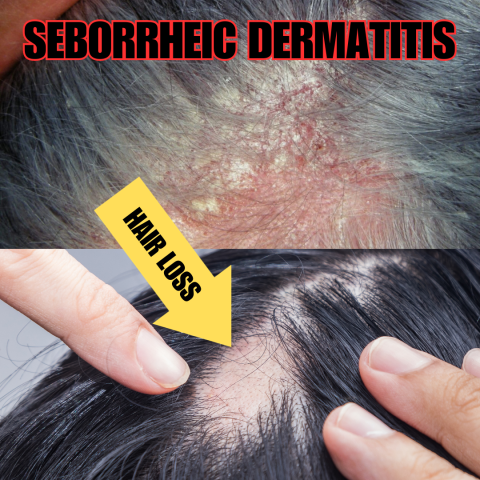Seborrheic dermatitis is a common skin condition that mainly affects the scalp, causing redness, itching, and flaking. While seborrheic dermatitis may not directly cause hair loss, persistent and severe cases of the condition have caused many to speculate that it could cause hair loss. The constant itching and inflammation associated with seborrheic dermatitis may cause individuals to scratch their scalp vigorously, damaging hair follicles, which many have associated with hair loss.
Can Seborrheic Dermatitis Cause Hair Loss
Additionally, some studies suggest that the presence of inflammation and specific immune responses in the affected areas could contribute to hair loss. It's important to note that hair loss related to seborrheic dermatitis is often temporary, and the hair may grow back once the condition is adequately treated.
If you suspect you have seborrheic dermatitis and are experiencing hair loss, it's advisable to consult with a hair loss physician. They can accurately diagnose and recommend appropriate treatments, including medicated shampoos, topical corticosteroids, antifungal medications, or other therapies to manage the condition and promote hair regrowth.
What Causes Hair Loss
Various factors can cause hair loss, and the specific cause can vary from person to person. Here are some common causes of hair loss:
Genetics (Hereditary Hair Loss): The most common cause of hair loss is a hereditary condition called androgenetic alopecia, more commonly known as male-pattern baldness or female-pattern baldness. It tends to occur gradually and in predictable patterns. Hair follicles in some regions of the scalp are genetically programmed to be more sensitive to DHT. This sensitivity is inherited and varies among individuals. In individuals with a genetic predisposition to hair loss, an enzyme called 5-alpha-reductase converts testosterone into DHT within the hair follicles.
Miniaturization of Hair Follicles:
- DHT hurts hair follicles by causing them to shrink or miniaturize. This process is known as follicular miniaturization.
- As hair follicles miniaturize, the hair they produce becomes finer and shorter with each hair growth cycle.
- DHT contributes to the hair follicles' shorter anagen (growth) phase. This means that affected hairs spend less time in the active growth phase before transitioning to the resting phase (telogen) and eventually falling out.
- Over time, the hair follicles produce increasingly shorter and finer hairs, leading to a reduction in overall hair density. With each hair growth cycle, the affected hair follicles produce smaller and thinner hairs, eventually leading to the complete cessation of hair growth in some follicles.
- This progressive miniaturization process is characteristic of androgenetic alopecia and is responsible for the familiar pattern of hair loss seen in males and females with this condition.
How To Treat Hair Loss
The two FDA-approved medications to treat genetic hair loss are Minoxidil and Finasteride. However, other emerging treatments may be on the horizon.
- Minoxidil: This over-the-counter topical medication is applied directly to the scalp. It is one of the most common treatments for genetic hair loss and has been shown to help promote hair regrowth in both men and women.
- Finasteride: This prescription medication is available for men and works by inhibiting the action of the hormone dihydrotestosterone (DHT), which is associated with hair loss. Women are generally not prescribed finasteride due to potential risks during pregnancy.
While dutasteride effectively reduces DHT levels more comprehensively than another 5-alpha-reductase inhibitor, finasteride, its use for treating hair loss is still considered off-label in many countries. Dutasteride is primarily prescribed for the treatment of benign prostatic hyperplasia (BPH), a condition involving the enlargement of the prostate gland.
There is evidence from studies suggesting that dutasteride may be more effective than finasteride in promoting hair regrowth and preventing further hair loss. Medication is the first line of defense in stopping the progression of hair loss.
However, the most effective method of regrowing hair remains hair transplantation. There are different hair transplant techniques, including Follicular Unit Transplantation (FUT) and Follicular Unit Extraction (FUE). FUT involves removing a strip of the scalp for harvesting follicles, while FUE involves individual follicle extraction. FUE is generally preferred for its minimally invasive nature and lack of a linear scar, but the choice depends on individual factors.
Where To Learn About The Best Hair Loss Treatments?
The Hair Restoration Network (HRN) is an online community and resource dedicated to providing information and support for individuals interested in or undergoing hair restoration procedures. The HRN forum is one of the largest and most active online communities where people share their experiences, discuss different hair restoration techniques, and seek advice from others who have undergone similar procedures.
The HRN forum is a platform where individuals can share their personal experiences with hair restoration procedures, including hair transplants, medications, and other treatments. Users can ask questions, seek advice, and discuss with others who have faced similar challenges. The network provides a platform for users to review and discuss their experiences with specific hair restoration surgeons. This can be valuable for individuals researching surgeons and clinics for their own procedures.
The HRN website offers educational content on various topics related to hair restoration, including articles, videos, and guides. This information can help users make informed decisions about their treatment options. Members often share before-and-after photos of their hair restoration journeys, visualizing the results achieved through different procedures.
The HRN community serves as a support network where individuals can connect with others who understand the emotional and physical aspects of dealing with hair loss. Supportive discussions can be beneficial for those considering or undergoing hair restoration. If you're interested in the HRN community, you can visit their website and participate in discussions, read reviews, and gather information from the shared experiences of others.

